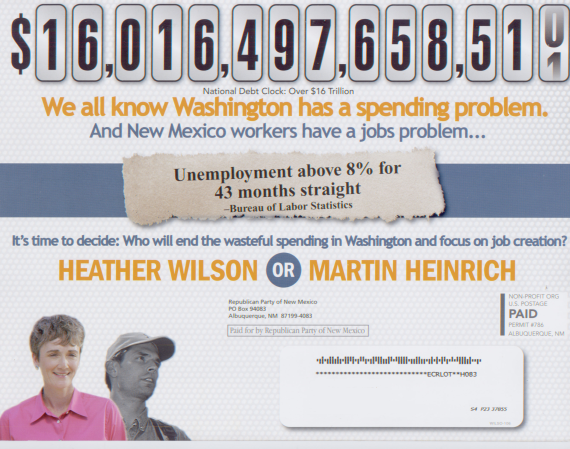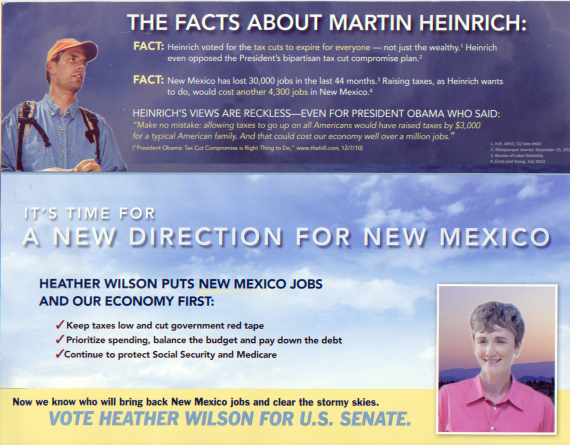New Mexico’s Republican Party misleads in two mailers attacking the state’s Democratic candidate for U.S. Senate, two-term Rep. Martin Heinrich.
- One mailer states that “New Mexico workers have a jobs problem.” But the state’s unemployment rate is 6.4 percent, well below the national rate, or the 8 percent figure the flier displays.
- Another flier claims that Heinrich voted for the Bush-era tax cuts to expire for “everyone.” Heinrich actually supported a bill that preserved the tax cuts for everyone except high-income taxpayers. What he opposed was a compromise measure that also extended the tax cuts for those at the top.
- The same mailer claims: “Raising taxes, as Heinrich wants to do, would cost another 4,300 jobs in New Mexico.” That prediction is based on a business-backed study that assumes the government will increase spending if it lets tax cuts expire for high-income taxpayers. Heinrich said he wants to reduce the deficit with that money, a course of action the study did not examine.
- A mailer fails to tell the whole story when it claims Heinrich’s vote for the stimulus allowed insurance company AIG to award executive bonuses using bailout money. Heinrich never had a chance to vote up or down on the bonus issue. A Senate version of the stimulus bill banned AIG from awarding bonuses. But that ban was removed before the bill returned to the House for final passage.
Heinrich holds an eight-point lead over Republican opponent Heather Wilson, according to the Albuquerque Journal’s latest poll. Wilson previously held Heinrich’s seat in Congress, serving five terms before she ran unsuccessfully for the U.S. Senate in 2008. Heinrich and Wilson are vying for the seat held by Jeff Bingaman, New Mexico’s senior U.S. senator, who is retiring.
Jamie Dickerman, communications director for the Republican Party of New Mexico, told us in an email that the organization “stands behind the facts presented and the citations given” in the mailers.
Our thanks to Allen Stenger of Alamogordo, N.M., who uploaded the mailers to our Spin Detectors page, through which we ask our readers to help us monitor political claims and campaigns across the country. Stenger, who is active in his local chamber of commerce, said he knew the mailer misled when it claimed that New Mexico has a “jobs problem” but cited the national unemployment rate.
Rate Spin
One of the mailers claims: “We all know Washington has a spending problem. And New Mexico workers have a jobs problem.” The flier then displays the faux headline “Unemployment above 8% for 43 months straight — Bureau of Labor Statistics.”
The mailer cites slightly older figures for the national unemployment rate, which dipped to 7.8 percent in September, ending the 43-month streak of rates above 8 percent. But New Mexico’s “jobs problem” hasn’t been as bad.
The state’s unemployment rate peaked right at 8 percent for five months in 2010. The percentage has been steadily falling since then, with preliminary numbers showing a rate of 6.4 percent for September.
Twisting the Tax Cuts
The state’s Republican Party also misleadingly claims that “Martin Heinrich voted for the tax cuts to expire for everyone — not just the wealthy. Heinrich even opposed the president’s bipartisan tax cut compromise plan.”
In 2010, Heinrich supported a bill that extended the Bush tax cuts for everyone except individual taxpayers making $200,000 or more a year and couples earning a combined $250,000 or more.
The mailer bases its claim on Heinrich’s vote against a subsequent compromise, which was brokered by President Barack Obama and congressional Republicans. That deal extended all of the tax cuts as well as unemployment benefits and other measures.
Heinrich joined more than 100 Democrats and 36 Republicans who voted against the compromise. He said the measure created too much debt.
“We shouldn’t saddle our kids with billions in debt just to provide tax cuts for the very rich,” he wrote on his website.
Slippery Study
The state Republican Party misleads again when it claims that “[r]aising taxes, as Heinrich wants to do, would cost another 4,300 jobs in New Mexico.”
First of all, the flier continues to omit the fact that Heinrich supports letting the tax cuts expire only for high-income taxpayers — not everyone. And the job-loss prediction comes from a study that examines what would happen if the tax cuts expire for high-income earners — not everyone.
Furthermore, that study assumes jobs would be lost if the government increases spending after those tax cuts expire. But Heinrich said he wants to reduce the deficit with that money, a course of action the study did not examine.
The accounting firm Ernst and Young produced the study. And it was commissioned by pro-business groups including the U.S. Chamber of Commerce and the National Federation of Independent Business, which lean strongly Republican.
Ernst and Young found that jobs would be lost when the resulting revenue “is used to finance higher government spending.”
Heinrich told the Albuquerque Journal in September that he would reduce the deficit with that money.
Heinrich: If we can put revenues back on the table — the Bush-era tax cuts for millionaires — we can reduce the deficit a lot more without the draconian aspects of sequestration. We can’t afford to keep doing what we’re doing.
As we’ve noted before, Moody’s chief economist, Mark Zandi, said it was “odd” that the study failed to examine what would happen if the higher revenues were simply applied to reduce future federal deficits.
Zandi said: “It seems to me that is the more relevant scenario. And my sense is that if they did, the results would be very different.”
Bonus Backstory
A mailer also states that “Heinrich’s vote for the stimulus allowed AIG to use bailout money to give million dollar bonuses to its executives.” The claim fails to tell the whole story.
Heinrich never had a chance to vote up or down on the bonus issue. A Senate version of the stimulus bill banned American International Group from awarding bonuses. But that ban was removed before the bill returned to the House for final passage.
A little background: AIG had arranged in early 2008 to award bonuses to employees through March 2009. Then, in the fall of 2008, the federal government began its bailout of the insurance company.
Heinrich took office in January 2009. The stimulus became law in February of that year.
As we’ve written before, the version of the stimulus bill that first passed the House lacked any language regarding bonuses. Democratic Sen. Chris Dodd of Connecticut included a provision in the Senate bill that banned companies such as AIG from awarding bonuses — regardless of previous contractual obligations — if they still owed money to the government for financial assistance.
The Obama administration then successfully insisted that a House-Senate conference committee soften the ban’s language so it applied only to bonus agreements arranged in February 2009 and later. The administration feared a prohibition on contractually-obligated bonuses — such as the ones AIG had already made — would not survive court challenges. (Heinrich was not on the conference committee.)
The bill that emerged from the committee, which Heinrich voted for and subsequently became law, did not prohibit the bonuses that AIG had already agreed to give.
— Ben Finley


